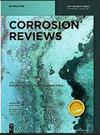多巴胺功能化涂层用于金属植入物的腐蚀防护和先进的药物输送:综述
IF 2.7
4区 材料科学
Q3 ELECTROCHEMISTRY
引用次数: 0
摘要
金属植入物的表面处理对其体内性能至关重要。生物相容性涂层在生物医学设备的防腐和其他实际用途中发挥着至关重要的作用,可避免手术失败并增强其功能。聚多巴胺(PDA)是一种受贻贝启发的合成聚合物,具有很高的潜力,可作为粘合中间层,增强金属基体与涂层材料之间的界面粘合,并用于植入物的防腐蚀保护。由于 PDA 具有良好的生物相容性和独特的载药前景,一些 PDA 改性纳米粒子也已成为药物载体的首选。这篇特写文章致力于总结 PDA 作为涂层材料在临床应用中的重要意义。文章首先介绍了多巴胺的聚合过程,然后介绍了 PDA 作为一种有效的涂层材料为植入物提供腐蚀保护的机理。此外,还讨论了含有 PDA 的涂层对植入物腐蚀保护的有利影响。接下来,重点介绍了 PDA 改性纳米结构,并强调了 PDA 的生物相容性。还讨论了 PDA 改性涂层/纳米颗粒在先进药物输送应用中的最新发展。本文章由计算机程序翻译,如有差异,请以英文原文为准。
Dopamine functionalized coatings for corrosion protection of metallic implants and advanced drug delivery: a review
The surface treatment of metallic implants is significant for their in-vivo performance. Biocompatible coatings play a crucial role in corrosion protection and other practical uses of biomedical devices to evade surgery failure and enhance their functions. Polydopamine (PDA), a mussel-inspired synthetic polymer, exhibits high potential as an adhesive middle layer to enhance the bonding at the interface between the metal substrate and coating materials and used for corrosion protection of the implants. Owing to its excellent biocompatibility along with unique drug loading perspective, several PDA-modified nanoparticles have also been preferred as drug carriers. This featured article is dedicated to summarizing the significance of PDA as a coating material for clinical applications. It was begun by describing the polymerization process of dopamine and then describes the PDA as an effective coating material for corrosion protection of implants with proposed mechanism. The beneficial effects of PDA containing coatings on corrosion protection of implants were also discussed. Next, was focused on PDA-modified nanostructures and emphasized the biocompatibility of PDA. The latest developments of PDA modified coatings/nanoparticles in advanced drug delivery applications were also discussed.
求助全文
通过发布文献求助,成功后即可免费获取论文全文。
去求助
来源期刊

Corrosion Reviews
工程技术-材料科学:膜
CiteScore
5.20
自引率
3.10%
发文量
44
审稿时长
4.5 months
期刊介绍:
Corrosion Reviews is an international bimonthly journal devoted to critical reviews and, to a lesser extent, outstanding original articles that are key to advancing the understanding and application of corrosion science and engineering in the service of society. Papers may be of a theoretical, experimental or practical nature, provided that they make a significant contribution to knowledge in the field.
 求助内容:
求助内容: 应助结果提醒方式:
应助结果提醒方式:


